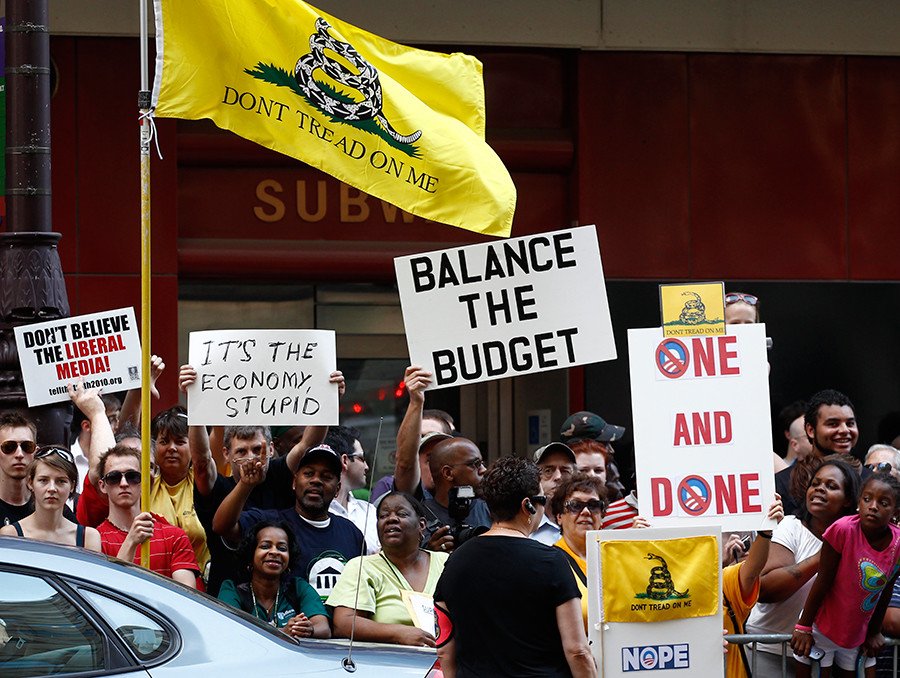‘Majority of Americans are libertarians’ – Gary Johnson to RT

Most Americans are libertarians, which means fiscally conservative and socially liberal, but they don't realize there is a party that represents that philosophy, Libertarian Party presidential candidate Gary Johnson told RT America’s Lindsay France.
The Libertarians are expected to get more votes than previously estimated. The party is already on the ballots in about 2/3 of states.
For third parties it takes tens of thousands of signatures and plenty of money to get presidential ballot access. According to a recent poll cited by the Atlantic, the majority of registered voters believe, to some degree, that America has “lost its identity”, while 64 percent want, to some degree, a “radical change.”
Could this feed into supporters for the Libertarians and can the party capture their interest when it comes to voting in November?
RT America’s Lindsay France discussed with Libertarian presidential candidate Gary Johnson his bid and what it will take to get Americans interested in libertarian policies.
Gary Johnson: The Libertarian Party is going to be the third party. They're going to be on the ballot in all 50 states, so by extension, the Libertarian nominee – and I hope that's me – is going to be on the ballot in all 50 states.
RT: In the face of the lower approval ratings for the Republicans and the Democrats, no one can deny that these are very divided elections: the rise of Bernie Sanders and Donald Trump is evidence of that. Have you seen the media and voters take more interest in the Libertarian side, the Libertarian viewpoint in philosophy because of this situation?
GJ: Not really, I think, the key to this is being in the polls that determines who is in the presidential debates. I really think that the only way that a third party, the only way the Libertarian Party, the only way I have a potentially winning is to be in the presidential debates. To be in the presidential debates you have to be at 15 percent in the polls. It's really a “Catch 22”: you’ve got to be in the polls to poll at 15 percent. And that's really the issue for us right now.
Talking smaller government and greater freedom with some great folks in #Indianapolis. #libertarian#tlotpic.twitter.com/Fk62zHVBlI
— Gov. Gary Johnson (@GovGaryJohnson) April 23, 2016
RT: It is kind of getting a B-star to become an A-rated actor: you need that exposure. It is like showbiz. If you don't get the publicity, you don't get the attention – if you don't get the attention, you don't get the publicity. This has been a huge problem for Libertarians are getting equal representation. Libertarian isn’t something new. The party has fought the good fight for a while now. Why does it take this much work for people to want to go to this ideology, for people to really consider it? What have the Libertarians not done right?
GJ: I think, the majority of people in this country are Libertarians. Speaking with a broad brush stroke, that is being fiscally conservative and socially liberal – most people fall in that category. It's just that they don't realize that there is an actual party that represents that philosophy and that is the Libertarian [Party]. We went out on the street the other day in New York with a film crew and asked forty people what it was to be or what a Libertarian was. Zero, Lindsay, zero. That is the reality. Right now the media talks about third party. Why don't they take the next half step and talk about who the third party is. It is the Libertarians. Always has been. And then the next half step would be: the presumptive nominee is Gary Johnson.

RT: Let's talk about the Tea Party. A lot of people were talking about the Tea Party when it hit the headlines. And that didn't pan out so well for constitutional Libertarians. But that got a lot of attention. Why couldn't the Libertarian turn that into something when voters said: “I'm not into this Tea Party thing. But here is the Libertarians”. And wasn't that a moment in the spotlight?
GJ: No, the Tea Party turned out to be socially conservative. That seems to be the Tea Party agenda. And Libertarians are not socially conservative. So initially, for me personally, the Tea Party was about dollars and cents. It was about smaller government. Yes, it was all on board but then very shortly it becomes all about social conservatism. I think, most people are not in that category. Let people live their lives as they see fit as long as what they do doesn't adversely affect others. Take the drug war as an example. Tens of millions of Americans who are convicted felons that - but for our drug laws - would otherwise be taxpaying, law-abiding citizens. The fact that we have the highest incarceration rate of any country in the world – that is the drug war; that is the manifestation of the drug war.
RT: Let's talk about some of the solutions that Libertarians talk about. You were one of three men to debate in a recently televised presidential forum. Three guys: Austin Petersen, John McAfee and yourself. I watched it. It seemed like a very common-sense conversation. One question was asked: which federal agencies would you dissolve? Peterson said all of them. McAfee said the FDA. You said the Department of Commerce and the Department of Education. But was that question even a smart one to ask? Because doesn't that just back up how extreme Libertarians are viewed and how unattainable those solutions are to the average voter? Isn't the idea to get people to vote for you based on their view that you can cause actual change? What are your thoughts?
GJ: What I tried to express in that debate and I think, I did is that we're vying for the presidency not to be dictator of the United States. But in that context, if you want to vote for somebody when it comes to smaller government, it is the Libertarian candidate. It's me. I think, the question was: what would you abolish if given the opportunity? That would just be a suggestion to Congress based on my experience as governor of New Mexico. If you are going to elect somebody that wants smaller government, you are going to get it. Because in this case the president of United States is the head of the administration.
The statements, views and opinions expressed in this column are solely those of the author and do not necessarily represent those of RT.












